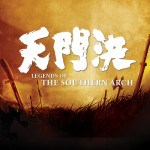“Patchwork Histories”
Reviewer: Jevon Chandra
Performance: 20 April 2018
Sitting around a Chinese banquet table, I am sipping on hot tea served in a porcelain white cup when Jodi Chan barges into May Blossom Restaurant, crying for her husband. I crane my neck to watch the proceedings, and forget that I am watching a theatre production. A car dashes past Waterloo Street. Yadid Jalil re-enters the scene, warning the Malayan People’s Anti-Japanese Army (MPAJA) members of incoming soldiers. He dashes off after delivering the message, ending the sequence in suspension, dream-like. I leave the cup of tea unfinished to follow my guide, who is armed with a light blue kerosene lamp, to the next location.
Four Horse Road successfully presents the complexities of historical narratives, and the tensions that arise from excavating the disparate spatial memories of Waterloo Street. True to the impossibility of grasping a complete history, the production is unapologetically void of subtitles. There must be bits of narrative that I missed, especially in conversations exchanged in Teochew and Japanese. In those moments of opacity, I find myself appreciating the textures created by the set, and the lingering air of a time past. I become an almost-witness to the tales of the very ground I am on.
However, at times, the haphazard sequence of narratives leaves me desiring for more than site-specificity to hold the production together. After two consecutive segments of foreshadowing, the mystery of the Orang Minyak, evoked by the Nantina Home and Convent School sequences, is left dangling. Moving from place to place feels random, despite having an initially promised overarching narrative thread.
What holds Waterloo Street together? Perhaps nothing, given how different the communities who have lived there are. It leaves me wondering if I am trying too hard to find an overarching coherence when there is none, and my attention is split from the immediacy of present events unfolding before me.
In some moments, I find myself pleasantly surprised by the nuance packed into short sequences. An honest statement from a Jewish Singaporean to a Catholic priest punctuated the air: “I don’t know what Catholicism preaches, but if you think I am refusing [to help you] because of my faith, you are wrong”. Igor Kovic struggles to reconcile real-world urgencies with moral principles – to be a good father by trying to protect his family while abiding by the commandment of “love thy neighbour” – is easily relatable. Elsewhere, a Chinese hotel employee learns about Guan Yin from an Indian temple worker while exchanging stories of belonging. The exquisite weaving of emotional detail within each scene refuses simple interpretation – each is fraught with dilemmas that I may, have, or will relate to at some point myself.
Amidst the shuffling between locations, sitting by the roadside, or on the pews, Four Horse Road is an invitation to look beyond these floorboards and alleyways we assume to be mere rehearsal spaces or rubbish dumps; to acknowledge the lives lived, loved, and lost.
Do you have an opinion or comment about this post? Email us at info@centre42.sg.
ABOUT THE PRODUCTION
FOUR HORSE ROAD by The Theatre Practice
4 – 28 April 2018
The Theatre Practice
ABOUT THE REVIEWER
Jevon recently graduated from Yale-NUS College with a Bachelor’s Degree in Arts and Humanities, and currently aspires to be a full-time artist and musician.





